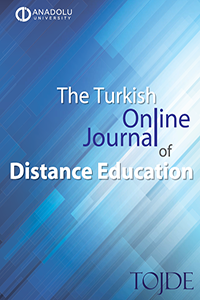Abstract
References
- Allwright, R. L. (1980). Turns, topics, and tasks: Patterns of participation in language learning and teaching. In D. Larsen-Freeman (Ed.), Discourse analysis in second language research (pp.165-187). Rowley, MA: Newbury House.
- Allwright, D., & Bailey, D. (1991). Focus on the language classroom. An introduction To classroom research for language teachers. Cambridge: Cambridge University Press.
- Atkinson, R. C. (1975). Mnemotechnic in second-language learning. American Psychologist,30, 821-828.
- Atkinson, R. C., and Raugh, M. R. (1975). An application of the mnemonic keyword to the acquisition of Russian vocabulary. Journal of Experimental Psychology: Human Learning and Memory, 104, 126- 133.
- Avila, E. & Sadoski, M. (2006). Exploring new applications of the keyword method to acquire English vocabulary. Language Learning, 46 (3), 379-395.
- Aydin,S. (2014). Foreign language learners’ interactions with their teachers on Facebook. System,42, 155- 163.
- Badri,A.(2015). The effects of Technology on Idioms: with a Focus on Law Terms (A Study in Payame Noor University, Tehran, Iran). International journal of educational investigations,2(8),43-53.
- Basoglu, E. B. (2010). A comparison of undergraduate students’ English vocabulary learning: Using mobile phones and flashcards. Educational Technology, 9(3), 1-7.
- Behnam,B., &Pouriran, Y. (2009). Classroom Discourse: Analyzing Teacher/Learner Interactions in Iranian EFL Task- Based Classrooms. Porta linguarum, 12,117-132.
Abstract
The aim of this article was twofold. First, it considered the effect of social networks (Telegram) on the
vocabulary knowledge of the participants, then it compared the participants’ responses in IRF (initiation,
response, & feedback) pattern in two different settings (traditional class and the online one). A group of
foreign language learners took the Nelson Proficiency Test and a total of 60 learners were selected to participate
in the study. Then they were randomly assigned to an experimental and a control group. After the treatment,
the pre-test and post-test results were compared. For the second part of the study, the participants’ comments
were analyzed quantitatively and qualitatively. The results revealed a significant difference between the two
groups, not only in their vocabulary knowledge but also in the way they communicated. This study has
implications for both teachers and learners to increase their awareness of the benefits of new opportunities
provided by technology in teaching-learning process.
References
- Allwright, R. L. (1980). Turns, topics, and tasks: Patterns of participation in language learning and teaching. In D. Larsen-Freeman (Ed.), Discourse analysis in second language research (pp.165-187). Rowley, MA: Newbury House.
- Allwright, D., & Bailey, D. (1991). Focus on the language classroom. An introduction To classroom research for language teachers. Cambridge: Cambridge University Press.
- Atkinson, R. C. (1975). Mnemotechnic in second-language learning. American Psychologist,30, 821-828.
- Atkinson, R. C., and Raugh, M. R. (1975). An application of the mnemonic keyword to the acquisition of Russian vocabulary. Journal of Experimental Psychology: Human Learning and Memory, 104, 126- 133.
- Avila, E. & Sadoski, M. (2006). Exploring new applications of the keyword method to acquire English vocabulary. Language Learning, 46 (3), 379-395.
- Aydin,S. (2014). Foreign language learners’ interactions with their teachers on Facebook. System,42, 155- 163.
- Badri,A.(2015). The effects of Technology on Idioms: with a Focus on Law Terms (A Study in Payame Noor University, Tehran, Iran). International journal of educational investigations,2(8),43-53.
- Basoglu, E. B. (2010). A comparison of undergraduate students’ English vocabulary learning: Using mobile phones and flashcards. Educational Technology, 9(3), 1-7.
- Behnam,B., &Pouriran, Y. (2009). Classroom Discourse: Analyzing Teacher/Learner Interactions in Iranian EFL Task- Based Classrooms. Porta linguarum, 12,117-132.
Details
| Primary Language | English |
|---|---|
| Journal Section | Articles |
| Authors | |
| Publication Date | October 1, 2020 |
| Submission Date | April 25, 2019 |
| Published in Issue | Year 2020 Volume: 21 Issue: 4 |


